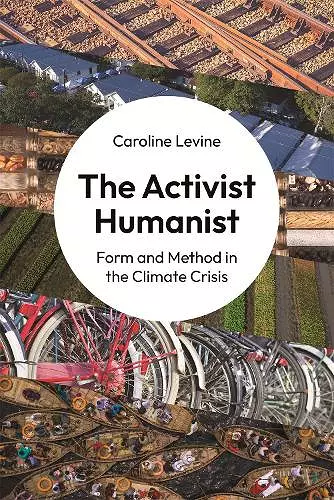The Activist Humanist
Form and Method in the Climate Crisis
Format:Hardback
Publisher:Princeton University Press
Published:17th Oct '23
Currently unavailable, and unfortunately no date known when it will be back
This hardback is available in another edition too:
- Paperback£20.00(9780691250588)

An argument that humanists have the tools—and the responsibility—to mobilize political power to tackle climate change
As climate catastrophes intensify, why do literary and cultural studies scholars so often remain committed to the separation of aesthetic study from the nitty-gritty of political change? In this thought-provoking book, Caroline Levine makes the case for an alternative view, arguing that humanists have the tools to mobilize political power—and the responsibility to use those tools to avert the worst impacts of global warming. Building on the theory developed in her award-winning book, Forms, Levine shows how formalist methods can be used in the fight for climate justice.
Countering scholars in the environmental humanities who embrace only “modest gestures of care”—and who seem to have moved directly to “mourning” our inevitable environmental losses—Levine argues that large-scale, practical environmental activism should be integral to humanists’ work. She identifies three major infrastructural forms crucial to sustaining collective life: routines, pathways, and enclosures. Crisscrossing between art works and public works—from urban transportation to television series and from food security programs to rhyming couplets—she considers which forms might support stability and predictability in the face of growing precarity. Finally, bridging the gap between academic and practical work, Levine offers a series of questions and exercises intended to guide readers into political action. The Activist Humanist provides an essential handbook for prospective activist-scholars.
"Levine’s call to bring humanistic tools into the world and into affirmative political projects is timely and invigorating. Our theories of change need to be rigorously debated more than they need to be defended and affirmed. Levine’s book offers several constructive steps to this end, and will hopefully inspire many more."---Anne Pasek, H-Net Reviews
"Countering anti-instrumentalism licenses Levine to offer compelling close readingsof diverse cultural texts which affirm that not all forms and structures are bad."---Adam Hansen, Modern Language Review
"
A timely book that addresses many of the questions animating contemporary ecocritical and environmental humanities debates, while voicing an urgent call to action directed at all academics.
"---Leonardo Nolé, Ecozon@ISBN: 9780691250816
Dimensions: unknown
Weight: unknown
224 pages